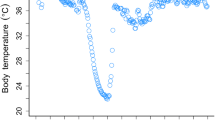Summary
The allocation of time to different behaviours (time budgeting) was examined in common shrews on a foraging grid under conditions of no competition or during conditions of apparent competition.
When a confined but detectable competitor was present, several behaviours, but especially those concerned with finding and ingesting prey, increased in their rate of performance. Over an entire experimental period, the number of prey items cached also increased.
A broad analysis of energy expenditure and consumption by shrews showed that both the total amount of energy spent and the amount of energy consumed per unit time increased when a competitor was present. Animals therefore showed marked changes in their time and energy budgeting as a result of perceiving a potential, but not actual, competitor.
Similar content being viewed by others
References
Barnard CJ (1980) Flock feeding and time budgets in the house sparrow (Passer domesticus L.). Anim Behav 28:295–309
Barnard CJ, Brown CAJ (1981) Prey size selection and competition in the common shrew (Sorex araneus L.). Behav Ecol Sociobiol 8:239–243
Barnard CJ, Brown CAJ (1982) The effects of prior residence, competitive ability and food availability on the outcome of interactions between shrews (Sorex araneus L.). Behav Ecol Sociobiol 10:307–312
Caraco T, Martindale S, Pulliam HR (1980) Avian time budgets and distance to cover. Auk 97:872–875
Churchfield JS (1979) Studies on the ecology and behaviour of British shrews. PhD thesis, University of London
Crowcroft P (1955) The life of the shrew. Reinhard, London
Davies PMC (1982) The ontogenetic weight dependence of metabolism in the Florida king snake, Lampropeltis getulus floridana. Comp Biochem Physiol
Kacelnik A, Houston AI, Krebs JR (1981) Optimal foraging and territorial defence in the great tit (Parus major) Behav Ecol Sociobiol 8:35–40
Kenward RE, Sibly RM (1977) A woodpigeon (Columba palumbus) feeding preference explained by a digestive bottle-neck. J Appl Ecol 14:815–826
Sibly RM (1981) Strategies of digestion and defecation. In: Townsend CR, Calow P (eds) Physiological ecology: an evolutionary approach to resource use, pp 109–139
Vogel P (1976) Energy consumption of European and African shrews. Acta Theriol 21:195–206
Author information
Authors and Affiliations
Rights and permissions
About this article
Cite this article
Barnard, C.J., Brown, C.A.J. & Gray-Wallis, J. Time and energy budgets and competition in the common shrew (Sorex araneus L.). Behav Ecol Sociobiol 13, 13–18 (1983). https://doi.org/10.1007/BF00295071
Received:
Accepted:
Issue Date:
DOI: https://doi.org/10.1007/BF00295071




